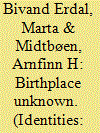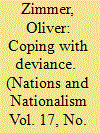| Srl | Item |
| 1 |
ID:
190117


|
|
|
|
|
| Summary/Abstract |
When naturalised citizens receive their passport, it is material and symbolic proof of membership in the nation-state, tying the individual to the nation and providing mobility resources. For naturalised Norwegian citizens, their birthplace appears in the passport. What might be the implications of removing this information? In 2016, the Norwegian government replaced birthplace details with ‘birthplace unknown’ in the passports of naturalised citizens from 31 Asian and African countries. Drawing on this case and 41 in-depth interviews with people of different citizenship-statuses, we analyse the role of the passport and birthplace information in it for naturalised citizens’ identity-construction. The procedural change led to an experience of devalued citizenship in practical, emotional, and symbolic ways, by those directly affected and others, showing the precariousness of identity for naturalised citizens. We find that the passport matters for identity-construction, as a symbol of national belonging, and suggests more-than-instrumental approaches to citizenship among immigrant populations.
|
|
|
|
|
|
|
|
|
|
|
|
|
|
|
|
| 2 |
ID:
107273


|
|
|
|
|
| Publication |
2011.
|
| Summary/Abstract |
This article highlights two processes that shaped Swiss nationhood in the long nineteenth century. The first concerns the competition between different nation-states and the nationalist visions these contests engendered. In a Europe dominated by the norm of the culturally and ethnically homogenous nation, the Swiss authorities, public intellectuals and various political representatives were desperate to display an image of national authenticity to the outside world. The result was a nationalism that combined voluntaristic and organic elements. In the second and main part of this article, the focus turns on citizenship; it is conceived not only as a social and legal institution, but also as a cognitive prism through which people defined their membership in the national community. Remarkably, the authority in granting national citizenship to foreign nationals remained firmly in the hands of the cantons and, above all, the Swiss municipalities. In practical terms, this meant that the Gemeinde provided the institutional and cognitive frame through which nationhood was primarily experienced, imagined and defined. While Switzerland represents a particularly strong case of a communalist polity, it should not be treated as unique. Instead, it should alert us to a potentially fertile yet little-explored area of research: what might be called the communal embededdness of the national(ist) imagination.
|
|
|
|
|
|
|
|
|
|
|
|
|
|
|
|